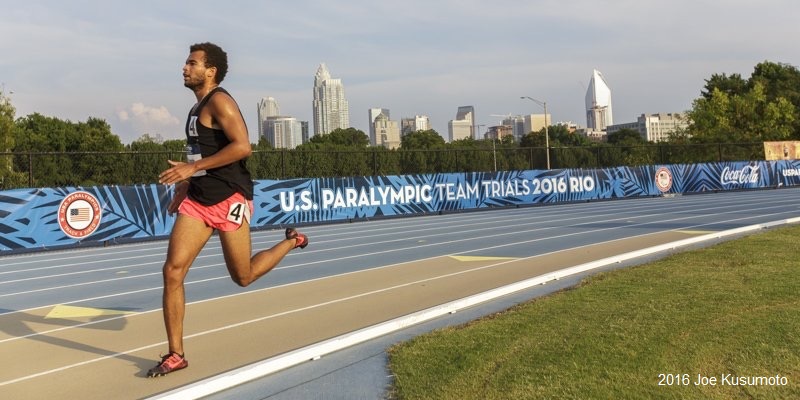Rediscovering Your Stride: A Rio 2016 Paralympian’s Journey with LHON
By: Stephanie Ross, USABA Contributor
Charles “Chaz” Davis, 24, was pursuing his collegiate running career at the University of Hartford when he began to unexpectedly lose his eyesight.
At the age of 19, the Grafton, Mass.-native was diagnosed with Leber’s hereditary optic neuropathy (LHON), a rare mitochondrial disorder.
“Every stage of grief was experienced by my whole family,” Chaz’s mother, Audrey Davis, said. “It’s hard to imagine the joys and heartaches of being a parent until you actually are one. My heart broke, but inside me I knew he was strong in spirit and I had faith he would overcome the depression.”
In 2014, Chaz eventually got the go-ahead by his neuro ophthalmologist to run, but the Davises weren’t sure how that would work.
“With no input on how [to guide run], it was literally a hit or miss,” Davis said. “He fell and had run-ins with cement poles and barriers, but his competitive spirit helped him get up and set goals.”
As Chaz found his stride, he knew he wanted to run in the Rio 2016 Paralympic Games. His first step was attending the 2015 U.S. Paralympic Nationals in Minnesota, where the Davises learned about the United States Association of Blind Athletes (USABA) and the classification process to race as a blind athlete.
“Our first trip was amazing, mostly because of the exposure to some incredible athletes and good-hearted people,” Davis said. “[Those] few days filled me up with hope. Learning about others that you can relate to, who get out and run, race, compete, travel – it lets you know that you can, too.”
Winning the 1500m and 5000m races, Chaz and his family traveled to Charlotte to later qualify for the Rio 2016 U.S. Paralympic team by winning the 1500m and 5000m races – again – at the U.S. Paralympic Trials, further strengthening the bond he’d made with his visually impaired teammates.

“Rio was an amazing experience for all of us,” Davis said. Chaz met athletes from all over, performed on the world stage, and ran well. When he returned, it was a quick turnaround, because he set yet another goal of running the full California International Marathon – his first marathon just a few months after Rio.
In 2016, Chaz set an American record at the USABA Marathon National Championships hosted in conjunction with the California International Marathon, which also qualified him for the Boston Marathon.
“USABA has enabled our son to pursue his dreams, continue running and meet people that he otherwise would not have,” Davis said. “I firmly believe that any person with a visual impairment can benefit from USABA. It’s a challenge to be physically active, but without resources or even an inkling of where to begin, it becomes much more daunting.”
For Davis, the ability to experience community and connecting with others through USABA is priceless.
“USABA excels at bringing people together,” Davis said. “I urge people to share their successes so that others might take a chance, and either be a sighted guide for a runner or be the runner, even if they’ve never done it before. We’re grateful for USABA and the people we’ve met.”
USABA hosts multiple sporting event across the country every year. To learn more, visit www.usaba.org/events.
